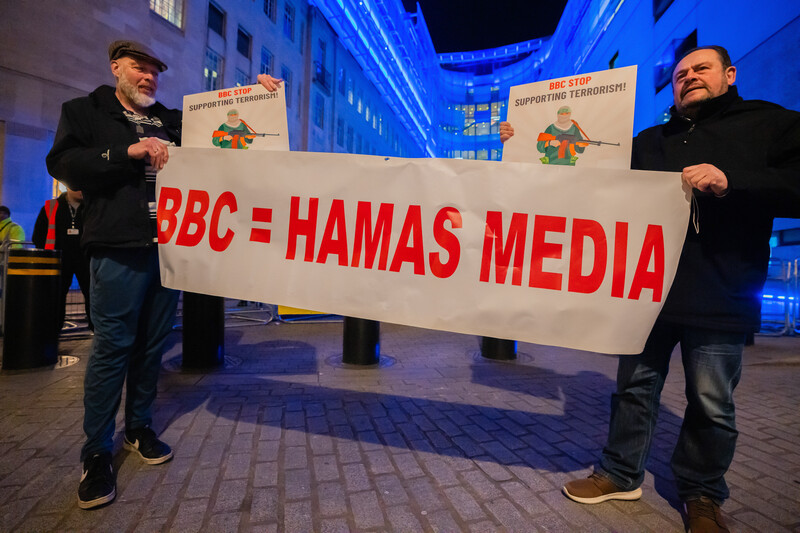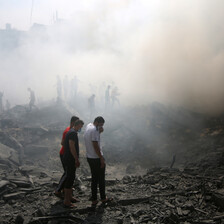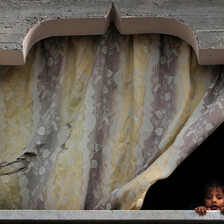The Electronic Intifada 7 March 2025

Israel lobbyists have for decades attacked the BBC and demanded it censor Palestinian voices.
ZUMA Press WireMore than two decades on, The Electronic Intifada has obtained a report the BBC has spent hundreds of thousands of dollars to keep under wraps.
In 2003, under pressure from Israel, its lobby groups in the United Kingdom and its many influential British friends, the BBC commissioned a senior news executive, Malcolm Balen, to analyse the corporation’s news and current affairs broadcasts on the Israel-Palestine conflict and judge whether they showed anti-Israeli, pro-Palestinian bias.
Balen studied BBC TV and radio broadcasts in the last six months of 2003, as well as online coverage into the first months of 2004, at the height of the second intifada.
The BBC did not publish the resulting 21,000-word report, and fought a long campaign not to do so. Supporters of Israel applied for its release under the Freedom of Information Act, but in 2010 the Court of Appeal ruled that the document should remain unpublished. In 2012, the Supreme Court rejected a further appeal under the Act.
I have now read the document, the first journalist outside the BBC to have done so.
In it, Balen finds no evidence of deliberate or systemic bias. These are his exact words, summing up:
”I am conscious that this report has been compiled under a weight of criticism from pro-Israelis and is, in some ways, shaped by it: not because their criticisms are necessarily any more accurate than those from pro-Palestinians, but because they [pro-Israelis] are responsible for the climate of perception which surrounds the BBC’s coverage.” [my italics].
Balen “found no evidence of deliberate or systematic bias,” which will be a disappointment to Israel’s supporters, who have spent much time and energy agitating for his review to be published, while the BBC’s legal expenses in fighting to keep it secret were more than $450,000.
Balen’s remarks on Zionist pressure explain much in light of the BBC’s panic decision to withdraw its documentary film Gaza: How to Survive a War Zone.
But the report goes much further, helping to frame the BBC’s continued, even increasing, pro-Israel slant in the 20 years since Balen reported.
Main points
It is important to record his main points. A major one was that the all-important Ten O’Clock News was “remarkably unanalytical” and that BBC TV news programs generally “should reflect more deeply on recent cause and effect.” Radio 4 news had a much more balanced and informative approach. He was harsh with on-line reporting, much of which he judged ill-informed.
He acknowledges that there is “some evidence to suggest” that Arab groups were right to complain that the prestigious late-night current affairs programme Newsnight interviewed too few Arabs.
But of the flagship morning radio programme Today, on Radio 4 (the UK political class’s wake-up briefing) he found there were more critics of Israel than supporters. He adds though that this did not mean that a pro-Palestinian voice prevailed. Of the counting heads and counting minutes brand of measuring broadcasts for bias or effect, Balen says: “I am not a fan of this type of methodology.” (He is right not to be.)
“The lesson seems clear,” says Balen. “If the BBC has the expertise … it should rely on correspondents of real weight and substance.”
Balen recommended the appointment of a Middle East Editor. This happened a year later just before the BBC Board of Governors filed a much more critical report than Balen’s, on impartiality in the Israel-Palestine conflict, after taking evidence from all sides.
The Governors made the same recommendation. They also found among other things that BBC reporting failed to reflect the enormous imbalance in resources and status between Israel and the Palestinians.
Jeremy Bowen was appointed Middle East Editor in 2005, and in my view has been a distinguished reporter and interpreter.
But he was for many years one lone voice, under much duress from the myriad monitors of the Israel lobby, and alone has not been able to halt the increasing tendency of BBC news to retail the pro-Israeli view.
People like us
The BBC’s Israel-Palestine coverage is under far heavier fire in 2025 than it was in 2003, now that there are many more critical analyses of BBC News from those who deplore its bias in favor of Israel, and its regular failure to recall the Palestinian history of dispossession, ethnic cleansing and oppression, or Britain’s historic responsibility for it.
Neither have Israel’s propagandists backed off: with legions of pressure groups and a supportive British government by its side, the Zionist lobby is even more embedded in the British system than it was in 2003 or 2004, and, in its special way, far more professional and better financed.
The Gaza documentary withdrawal is a prime example of how the BBC panics under pro-Israel pressure, and acts immediately to pacify the lobby, but more or less ignores complaints of real merit from the Palestinian or indeed basic human rights sides.
What Balen did, mainly, was to address the mechanics of news under the shadow of pro-Israel pressure. He writes that Israel’s supporters “are responsible for the climate of perception which surrounds the BBC’s coverage.”
What I think he meant then, and is certainly true now, is that the BBC constantly looks over its shoulder at Israel’s supporters, waiting for and usually receiving loaded criticism and even abuse for perceived slights to Israel. To this has been added the spectre of the new “anti-Semitism,” i.e. criticism of Israel, sparked by the publication in 2015 of the International Holocaust Remembrance Alliance definition of anti-Semitism. This gave examples of anti-Semitism that appeared to conflate criticism of Israel with being anti-Jewish.
This is a smear few wish to risk, not least at the BBC, and the news is thus shaped defensively, to appease these critics and pre-empt attacks. Over the other shoulder lurks Westminster, a friendly receptacle for Zionism, especially in Number 10 Downing Street. This tendency and this imbalance of influence on the BBC is more pronounced in the 2020s than it was even in Balen’s day, when the BBC was at odds with an aggressive government under former Labour leader Tony Blair.
How does this bias work? Balen did not examine in detail what I would call the casting of, or perception of the news in a western newsroom: how individual newsmakers’ language, upbringing, background, age, education and endemic bias feed into how stories are written and shaped. These innate tendencies in many news staffs are easily manipulated to favor Israel and Israelis, or at least to try not unduly to offend them. Israelis are, after all, it is implied or inferred, “People Like Us.”
This cast of mind has made it easier for the BBC during the past 20 years to continue to try to frame defensively the story of Israeli military occupation, incessant and increasing theft of Palestinian land and now visual, daily evidence of wilful ethnic cleansing by military force, even genocide.
If it were not for Palestinian (Arab) dissidence and violence, the BBC implies, Israel would not have to react in the way that it does. It has a right to defend itself, we repeatedly hear, unchallenged, from our elected leaders.
These western perceptions and framings make it easy for news managers to humanize and personalize Israelis, and present Israel as a “civilized” state under attack while Palestinians are shown as at best a troublesome mass manipulated by “terrorists. “
No examination of 7 October
This framing has never been more vividly illustrated than during the events of the past year and a quarter, beginning on 7 October 2023. From the first full BBC current affairs program I heard, at 1 pm on BBC Radio 4 the next day, it was as if that Saturday had been Day One of the whole Israel-Palestine struggle. Sixteen years of Israeli siege and continuing military assaults on Gaza went missing.
7 October, as a result of the many deaths that day, was ever after awarded its persistent health warning adjective: “savage,” “horrendous,” “merciless,” “horrific.” Even the most even-handed of commentators still feel compelled to add such qualifiers.
The false charges of baby murders and rape, meanwhile, were endlessly repeated, often without challenge, and continues today. BBC radio current affairs presenter Sarah Montague on 20 February, 2025, on Radio 4’s The World at One, described 7 October thus: “When Hamas went on a murderous kidnapping rampage…”.
That is the voice of the BBC?
The BBC never tried to replicate the rigorous attempts by organizations such as Al-Jazeera, Middle East Eye, The Electronic Intifada and many Israeli investigative reporters to find out who did what, who killed whom and how that day, what were battlefield casualties and what were atrocities. The 7 October death toll is as a result almost always mis-described.
Israel’s hourly blitzkrieg of largely civilian targets for 15 months earns no such adjectives.
Neither has there been an informed examination of the nature of legitimate (under international law) armed resistance against an aggressive military occupation. The BBC admires the anti-Nazi European resistance movements of World War II, and has often romanticized them in fictional radio and TV series, though all of them involved savagery, the death of innocents, bloody reprisals and fury amongst occupied as well as occupiers.
Ukrainian resistance is heroic and necessary, but the Palestinian version not so.
The case is rarely heard on the BBC: 77 years since the Nakba and after 58 years of unlawful Israeli military occupation, why should not every Palestinian be a member of the resistance?
Most recently, the release of captives has been a vivid example of the way the BBC uses language, almost imperceptibly to the unaware ear, to indicate to its audiences which victims are a little more human than others. The Israeli “hostages” (not prisoners of war, as some are, not captives) are always “reunited” with “their loved ones”, and interviews with those loved ones are vivid, personal and usually in English.
The Palestinians remain largely anonymous, and are invariably described as “prisoners” even though many are detainees, held illegally, and even the convicted have in most cases been made so by military tribunals. The BBC finds much less will or time to tell these individual stories in its flagship bulletins and current affairs programmes.
In much of the BBC coverage, Hamas’ or Islamic Jihad’s actual handovers of the captives to the International Committee of the Red Cross come under hostile scrutiny. When, as was normal, the occasions proceeded smoothly they were “orchestrated” or, more sinisterly, “choreographed”, for public relations purposes.
Attendant crowds were both too great for comfort for the BBC reporters, but later shown by BBC Verify to be actually smaller than they had looked in tight camera shots. This too was presented as fakery.
Israeli agenda prevails
The Palestinians just could not get it right. When three women prisoners of war were released they looked, to western eyes, including those of the BBC, fit and well fed. But when three male captives were freed, looking “gaunt”, this was evidence of Palestinian cruelty.
No-one asked if Palestinians in Gaza had lost weight. No-one asked how any human might appear after 15 months underground during incessant siege and bombardment
When four Israeli bodies were returned in coffins, in a solemn ceremony, complaints about the alleged indignity of the occasion framed much of the BBC coverage. There was no reminder of the indignity of the many thousands of Palestinian bodies that remained under the Gaza rubble, or of the shattered remains we had seen almost daily, for 15 months, Gaza’s bereaved carrying in shawls, blankets and plastic bags.
Israel’s propaganda machine sets the agenda. Most recently we have seen the BBC fall hook, line and sinker for the Israeli allegations that three hostages, a mother and her two children, were fatally assaulted by Palestinian fighters, not in Israeli bombing raids, a version of events that was backed by nothing but Israeli say-so.
We have heard and seen far less about the freed Palestinians. The BBC has not told us much about the torture, beatings, humiliations and often deaths of Palestinian prisoners. BBC reporting of the notable case of Dr. Hussam Abu Safiya, head of the Kamal Adwan Hospital in Beit Lahia in northern Gaza, which Israeli forces destroyed a few days after Christmas 2024, did not mention the evidence from the lawyer who visited him that he had been chained, tortured and beaten.
An exception to this one-sided coverage was when the BBC News Channel brought in an experienced Middle East specialist, Sebastian Usher, whose commentary was calm and accurate. Alongside him a Palestinian journalist from the BBC Arabic Service enhanced the commentary with his view of the Palestinian releases.
The BBC can do it, but more often chooses not to. There have been all too rarely Jeremy Bowen’s informed analyses, good reporting from Tom Bateman, Yolande Knell and Jon Donnison – who was traduced by the BBC when it apologised for his considered but caveated judgment that it was Israel that bombed the Al-Ahli Arab Hospital ten days after the October 7 breakout. (Israel was almost certainly responsible, but the matter has been diplomatically dropped.)
Presenter Mishal Hussain often launched incisive questioning of the Israeli position on the Today Programme, but she left the BBC late in 2024.
Where are the experts?
Such exceptions are shafts of light through clouds of unbalanced coverage that protect Israel where possible. Studio discussion invariably tips to the view that, at best, while Israel has done shocking things, the Palestinians, including Hamas’s “terrorists,” are just as bad, even responsible for the carnage since 7 October: were the resistance and the effective government of Gaza to disappear, we are led to infer, all might be well, and a two-state solution in reach. This turns history on its head.
Where are the experts? Where are the historians, such as the Israeli-British scholar Avi Shlaim, professor of international relations at St. Antony’s College, Oxford, the British-resident Israeli historian, Ilan Pappe, head of the Middle East programme at Exeter University? Or Rashid Khalidi, one of the United States’s leading historians of the Middle East?
Between them, these three alone have written a score of volumes on Israel-Palestine history, but not one of them has appeared on any BBC outlet since 7 October 2023. Instead, timorous British politicians and ponderous think-tankers are outmanoeuvred by articulate Zionists under the direction of ill-informed hosts.
The Western view prevails. In the end, it is “Them”, the Palestinians, against “Us”, or “People Like Us,” the Israelis.
The BBC has broken faith with a large proportion of the people it is supposed to serve: the British tax-paying public, who fund it. It is wrong to accuse the BBC of being the state broadcaster, because if it were we could not complain that it reflected government positions. It is breaking its contract with its clients, those who pay, and those millions overseas who trust it, because it tips the editorial balance in favor of Israel and Britain’s close alliance with Israel.
One ominous example of this is the BBC ignoring the threat in the United Kingdom (and across Europe to public debate and protest on the Palestine question. The regular and massive marches in support of Gaza in particular and the Palestinians in general are unreported except in terms of the number of arrests, which are minimal and usually either for minor offences or at the hands of over-zealous policemen. Police violence and suspected entrapment of marchers at recent events are never reported.
The many dawn raids and airport arrests of critical journalists and known campaigners against Israel, some of them Jewish critics of Zionism, and the court cases that sometimes result, as well as the obviously questionable manipulation of anti-terrorist legislation remain unremarked by the BBC.
Why the secrecy?
Athwart all this is the attempt to orchestrate silence on the Palestinian-Israeli question. The BBC’s failure to report the various systems in place to shut down debate or protest, in our places of learning in schools and universities, in council chambers, in village halls and in the streets and other public spaces, is at one with its broader and long-continuing policy of trying to obscure the causes of Palestinian rebellion, the nature of resistance and the aims of the Zionist settler-colonial state.
So, why has the BBC kept Balen’s report secret?
Certainly, to publish would have breached confidentiality regarding the corporation’s inner workings and of staff members, many of whom were named.
But I suggest there was a more defensive reason. The pro-Israel lobbyists and pressure groups would have regarded the report – which did not as they expected find coverage slanted against Israel – as a whitewash. Most of the mainstream print media would have supported them. It would have been yet more ammunition for the Zionists and their many powerful friends to fire at the BBC.
There was also considerable pressure on the BBC from the pro-Palestinian, pro-rights lobby. This was best set out by Greg Philo and Mike Berry in their book Bad News from Israel, also published in 2004, which found BBC and ITV coverage of Israel/Palestine heavily slanted against the Palestinians and seriously lacking historical context and explanation.
One outcome of this hiatus was that the BBC turned to its Board of Governors. They appointed a panel whose Report on Impartiality, published in 2006, found that the corporation’s coverage of the issue was failing to take into account the considerable imbalance between the stateless Palestinians and the western-backed state of Israel, and failing to provide proper background and context.
Except for the subsequent appointment of a Middle East Editor, the BBC has largely ignored the governors’ report.
Tim Llewellyn is a former BBC Middle East Correspondent. He gave evidence in 2006 to the BBC Board of Governors Impartiality Commission, and has written and spoken widely since then on BBC Middle East coverage.





Add new comment